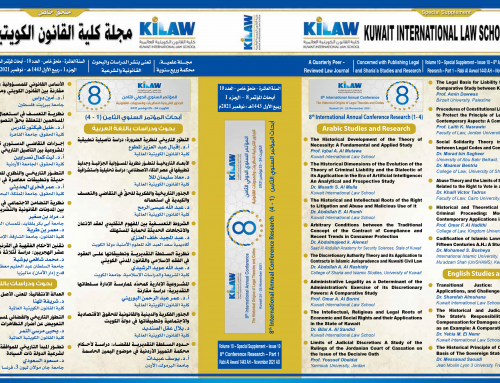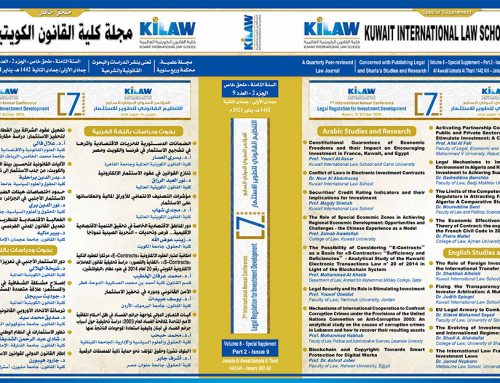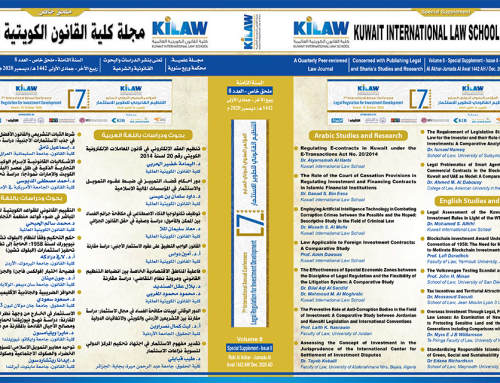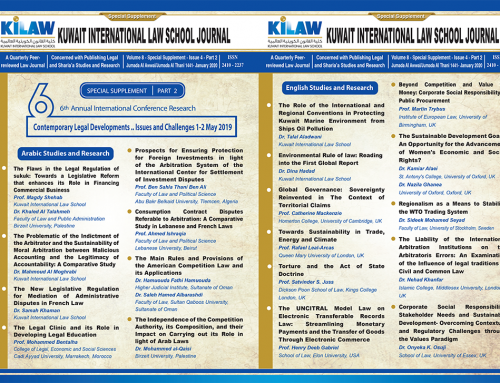Editor-in-Chief Prof. Badria A. Al-Awadi
The legal system in the Arabic communities especially and third world societies generally, is passing through unprecedented throes, characterized by a decline in the respect for laws and a weakness in its position among different sectors and groups, where some influential and active in the economy, security and social aspects of the community. It is also characterized by the widespread of lawlessness and chaos in many cities, as the language of bullet and exclusion is now a substitute for dialogue and coexistence. Although human communities had lived in similar situations in its near history, as was the case of the two world wars and the war of Bosnia and Herzegovina, Palestine, Iraq and others, which requires avoiding slipping back into such situations and seeking refuge in regulations, laws, development and reform, we are witnessing another wave of decline of the rule of law and a spread of chaos, corruption, tyranny and the narrow spaces of freedom and democracy that were acquired during previous phases, as confirmed by local and international reports regarding the functioning of institutions and the respect for laws, rights and freedoms.
Perhaps the most serious issue at this stage is the regression in the belief of the importance of such laws and regulations as a framework to regulate coexistence and cooperation between the various categories of local and regional communities, particularly in the sector of law drafters and interpreters, we do not only mean individuals but also constitutional, legal and judicial institutions, as major corruption cases related to these institutions are revealed in many countries, as favoritism has grunted the solid pillars of forming these institutions which has been negatively reflected in the areas of values and performance, etc. People working in the legal fields are willing to sacrifice the need to respect the law and regulations, and in particular the values of freedom, justice and coexistence, in exchange for limited narrow interests, indifferent to the security and stability of societies and the aspirations of the new generations.
This situation is reflected on the declining intellectual and judicial jurisprudence, where rigid interpretations of texts prevailed, and the flexibility required for developments in many sectors has gone missing. New legislations have also become defective and unable to achieve their purpose, and the need to amend them shortly appears after their publication and dissemination, which reveals the absence of effective vision and seriousness of sponsors and poor legal skills, and the lawmakers being influenced by what is going on around them from the conflict of interests, while disregarding national and social interests, which requires selflessness and community service from a legislative position, as well as supervision and accountability of the executive authority. Quality jurisprudence protecting public rights and freedoms has been absent from the judicial institutions in the Arab world, especially the third world, in addition to those required in civil and social disputes adjudication, especially in the light of new developments and challenges imposed by new and accelerated lifestyles.
In search of deeper causes of the crisis of the Arab legal thinking starting with the beginnings of the 21st century, many do not hesitate in pointing fingers to educational systems, institutions, methods and outcomes, and they are right. The educational institutions still rely on traditional curricula, excluding modern curricula and not seeking renewal and innovation which would encourage students and researchers toward independent reasoning and critical thinking, and therefore, they are held responsible. However, the whole deal is perhaps deeper and wider and needs to be examined and scrutinized particularly by the Arab legal elite.
There is no doubt that the Fourth Annual Conference of Kuwait International Law School which has focused its theme for this year on reform and development of the role of law has raised issues that are not far from this scope, because it has stimulated and affected diligent researchers and those who are interested in different aspects of law to look at aspects of the legal and legislative reform and development which is needed by Arabic societies. Its organizers have threw a stone into the almost stagnate waters with all its accumulated dust and stones, as is the Arab legal thinking, which needs renovation, new blood, critical thinking, a healthy environment, as well as brave scholars and researchers would are willing to fight for its development.





